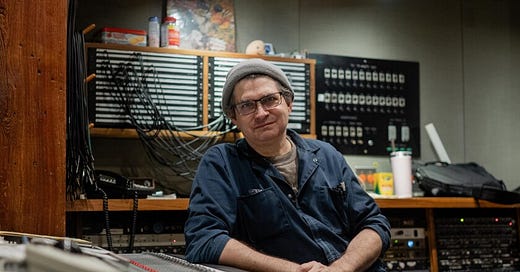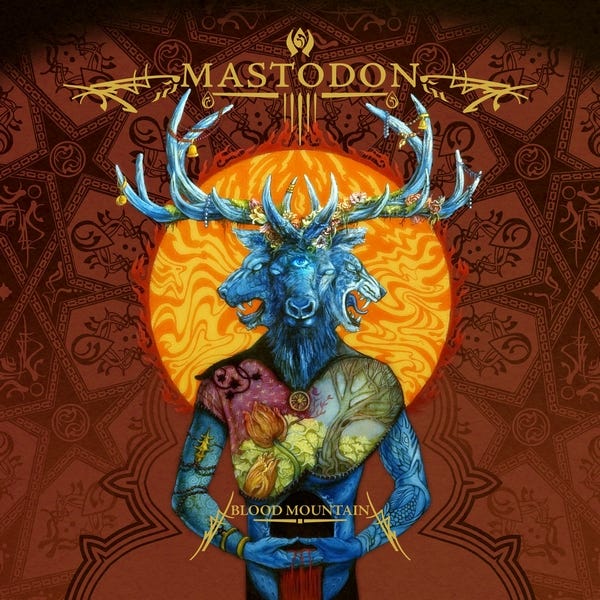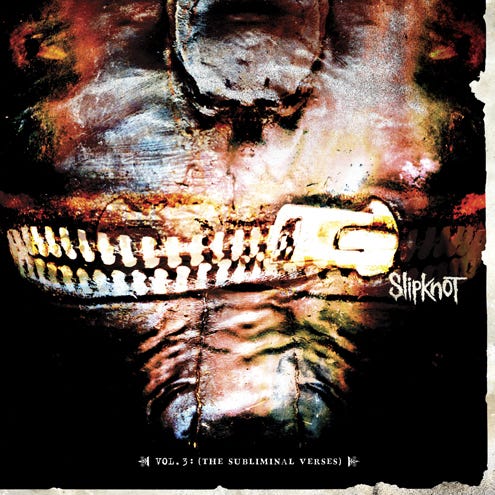Happy Friday, everyone. I was 75% finished with a different intro in which I read way too much into an ad for a lemon-lime soda. I’m going to postpone that letter till next week. Instead I’d like to take a quick moment to talk about Steve Albini, the prolific recording engineer and indie rock musician who passed away this week of a heart attack. He was 61.
I’m a little at a loss as to where to start with Steve Albini. The sheer breadth of his catalog as an engineer defies summarization. All roads through underground rock in the last 40 years pass by Electrical Audio. I first encountered Albini, as I imagine many did, in the liner notes of In Utero, Nirvana’s final myth-demolishing studio album. It wasn’t until a few years later that I realized he was the same guy that recorded the Pixies song I’d covered in my first high school rock band. And the same guy that recorded Godspeed You Black Emperor. And Joanna Newsom And Neurosis. And High on Fire1. And PJ Harvey. And Mono. And so on and so on.
Albini came by this daunting resume honestly. For all of his faults, which I’ll get to shortly, no one can deny that the dude walked it like he talked it. He kept his prices low, worked quickly, didn’t take royalties, and refused to be called a producer because he believed that recording was a craft and that the music should speak for itself. Still, despite this hand’s off reputation Albini couldn’t help but have a sonic fingerprint. Rock drummers of a certain age can probably ID an Albini drum sound within seconds. Every Albini record that I’ve heard, admittedly a fraction of his total output, sounds distinctly like it’s happening in a place. The sounds aren’t being beamed in from some crystalline vacuum, they’re bouncing off the walls, floor and ceiling of a real room.
Albini’s commitment to this ethos also made him something of a crank. I wonder if with some truth serum a lot of arguments against rockism wouldn’t boil down to “disagreeing with Steve Albini”. Make no mistake, the guy could absolutely come across as a cartoon of the condescending Gen X music snob. This quality made him great at delivering pithy takedowns of beloved bands he saw no need to respect. The guy was exceptional at calling out music industry bullshit. Seriously, any musician reading this who hasn’t read “The Problem with Music” needs to get on that now as a matter of self-preservation. At the same time, Albini’s confrontational attitude also produced some really regrettably gross music, though he made real efforts later in his life to address his shortcomings head-on and talk about what he learned since publicly. Like I said in my letter about Trent Reznor a few weeks back, I’ve got a lot of respect for any musician who can avoid the trap of arrested development so prevalent among rockers.
I met Steve Albini exactly once, in 2011. I was still attending Columbia College in Chicago. One of the ensembles I played in was asked to perform at an event for the music business students alongside guest talks from Pitchfork’s Mark Richardson and Steve Albini. After nervously pacing the hall for 15 minutes I finally worked up the courage to go up to him. He patiently listened as I asked him Chris Farley-esque questions about working with Godspeed You Black Emperor and Neurosis and gave me thoughtful, straightforward answers. The whole time he seemed completely relaxed and not at all disturbed to spend a few minutes talking to a jittery student. Then he walked on stage and casually spat venom in the face of a room full of aspiring A&Rs and tour managers, all while radiating the same laid back calm that he’d displayed in my conversation moments before. What an incredibly cool dude.
61 is too young, and that’s all I have to say about it.
# # # # # The Self Promo Zone # # # # #
On the subject of harsh music from the Midwest, I spoke to Brian Barr of the doom metal band Aseethe on the latest episode of Lamniformes Radio. We talked about the band’s upcoming record The Cost, the realities of touring in an underground band in your middle-age, why Barr almost stepped away from doom metal entirely during COVID, and more.
I also have an album of my own out now. It’s called The Lonely Atom and I’m pretty sure it would make Steve Albini spin in his grave. I made it with a number of my friends during COVID when it wasn’t possible to play music in the same room together. Appropriately, it is an album about what happens when humans are divded from each other and from themselves. Its the best neo-nü-metal album you’ve ever heard, and you can hear it on my Bandcamp:
~ ~ ~ ~ ~ Listening Diary ~ ~ ~ ~ ~
Here are five songs that I enjoyed listening to recently! You can find a playlist with all of this year’s tracks at the bottom of this section.
“Un Diá Seré Feliz” by Ray Barretto (Rican Struction, 1979)
Salsa spring continues! I knew I had to give this record a listen once I saw that title/cover combo. This tune feels like it’s closer to the jazz fusion side of the genre. Like I mentioned last week, my ears are trained on the bass part. This bass line comes courtesy of Sal Cuevas, who steps into the spotlight in the bridge with an awesome chorus effect. I love how wild the bridge gets and how nonchalantly the song strolls back into the verse as if nothing out of the ordinary happened.
“Vigilante” by Héctor Lavoe & Willie Colón (Vigilante, 1982)
Wow, this is gorgeous. Reminds me of the Hot Buttered Soul-era Isaac Hayes stuff in its patience and scale. Not exactly breaking any critical ground by calling a movie score “cinematic” but hey if the shoe fits. There’s a lot to love in this lengthy track but I’m particularly fond of the guitar solo about halfway through.
“Atmun” by Osiris (Osiris, 1983)
In case you’re getting numb to all the salsa, here’s a ripping prog rock instrumental from Bahrain. Big fan of the interplay between the guitar and the synth leads on this tune, especially that descending line that gets announced by a huge drum fill down the toms. Very neat the way they rework the melody to fit the new meter that kicks in halfway through the tune. Check this out if you’re into Camel or other similar prog bands.
“Problem Number 6” by Bruno Pernadas (Those Who Throw Objects at the Crocodiles Will be Asked to Retrieve Them, 2016)
Bright, colorful jazz fusion from Portugal with a global grab bag of instrumentation thrown in for good measure. Harmonium, North African-style guitar work, pillowy soft synth leads, vocals delivered in an MPB whisper, and a relentless groove from the bass and drums. Put this on while taking a long walk with the sun still out.
“Oyelo Que Te Conviene” by Eddie Palmieri (Unfinished Business, 1975)
Whew! This might be the best salsa tune I’ve heard yet. I love how long the stormy verse goes on for (nearly 90 seconds) before the song finally arrives at the chorus, only for that payoff to feed straight into the lengthy drum and piano solo. Incredible interplay between the percussionists and a hypnotic, spiraling piano line, all building to a return to thunderous return to the chorus. Terrific!!
\ \ \ \ \ Micro Reviews / / / / /
Here are five micro reviews of albums from my old CD collection. Long time Lamniformes Instagram followers will recognize these from my stories back in late 2020. They’ve been re-edited and spruced up with links so that you can actually hear the music instead of just taking my word for it.
Blood Mountain by Mastodon (2006) - Metal
The highly anticipated follow-up to their breakout album Leviathan. Features guest spots from members of Neurosis, Queens of the Stone Age, and The Mars Volta. Feels like they knew this one was a big deal and went all out to make it a classic. Brann fucking Dailor, man. Some of the best drumming in metal on this album. I was so proud of myself when I learned how to play the fill that starts the record. The first seven tracks are pretty much perfect, after that it falls off to being just very good.
Define the Great Line by Underoath (2006) - Post-Hardcore
I thought this band was super corny, couldn’t stand their approach to melody or their lyrics, but I’d heard that this record was darker/heavier than their usual fair and after a bad day at high school I took a chance and picked it up. Emo comes for us all. You can tell they’ve listened to Botch or were at least responding to other bands that were. The drums are nasty, but I am still not in love with the vocal melodies. Still, as far as this type of popular post-hardcore goes, I think this is pretty high quality.
Cruelty and the Beast by Cradle of Filth (1998) - Black Metal
I remember a well adjusted classmate of mine in high school freaking out at the art when I pulled this CD out of my backpack lol. This is a concept album about Elizabeth Bathory, a perfect topic for a gothic metal record. While the remastered version of this album is a SIGNIFICANT improvement, the original is no slouch. The Brits understand that metal is a bit of a laugh, so this thing is gloriously over the top and packed wall-to-wall with great riffs and Maiden-esque lead guitar. The lyrics are also legitimately well written in a way that should embarrass most metal bands.
Dusk and Her Embrace by Cradle of Filth (1996) - Black Metal
Probably the last album Cradle of Filth made that could be credibly connected to the underground black metal scene. You can already hear them aiming for a more conventional classic metal sound updated for an extreme metal audience. This band catch a lot of flake for their image and edgy merch, as well as their appeal to the Hot Topic set (none of this is a problem to me) but even the haters have to acknowledge that their riffs are great. Cradle of Filth really carried the torch for the Iron Maiden style for a while. The vocals are the big litmus test, but I think they fit the spooky vibe.
Vol. 3: The Subliminal Verses by Slipknot (2004) - Nü-Metal
The first Slipknot album I heard after Josh Landis of Limbs Bin played me the “Duality” video and blew my middle school mind. This is the first album where Slipknot started writing pop choruses and acoustic tunes. I always chuckle at the image of nine guys in jumpsuits and serial killer masks gathering around the mic to play shakers and coo backing harmonies. This mix is very weird, hyper compressed and dry. When things get really heavy it can sound like the whole band is tumbling down a staircase. The good tunes are very good, but the “obsessive self-pitying stalker” stuff in the lyrics is a turn off these days. Strange album.
I covered one song that High on Fire recorded with Albini in Drumming Upstream #41









